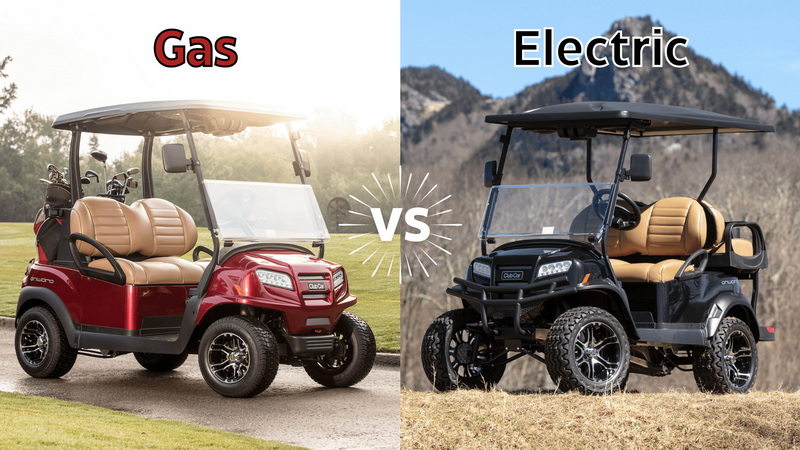Content Menu
● Understanding Torque in Golf Carts
● Electric Golf Carts: The Torque Champions
>> Instant Torque Delivery
>> Higher Torque Output
>> Consistent Torque Across Speed Range
● Gas Golf Carts: Power and Range
>> Higher Horsepower
>> Longer Range
● Performance Comparison
>> Speed
>> Acceleration
>> Hill Climbing
● Environmental Considerations
>> Emissions
>> Noise Pollution
● Maintenance and Operating Costs
>> Maintenance
>> Fuel/Energy Costs
● User Experience
>> Noise Level
>> Smoothness of Ride
>> Refueling vs. Recharging
● Future Trends
>> Electric Golf Carts
>> Gas Golf Carts
● Conclusion
● Frequently Asked Questions
>> 1. Are electric golf carts faster than gas golf carts?
>> 2. Do electric golf carts perform well on hills?
>> 3. How often do I need to maintain an electric golf cart compared to a gas golf cart?
>> 4. What's the typical range of an electric golf cart compared to a gas golf cart?
>> 5. Are electric golf carts more environmentally friendly than gas golf carts?
In the world of golf carts, the debate between gas and electric models has been ongoing for years. One of the key factors in this discussion is torque, which plays a crucial role in a golf cart's performance. This article will delve deep into the torque comparison between gas and electric golf carts, exploring various aspects of their performance, efficiency, and overall user experience.

Understanding Torque in Golf Carts
Before we dive into the comparison, it's essential to understand what torque is and why it matters in golf carts. Torque is the rotational force that causes an object to rotate. In the context of golf carts, it's the force that turns the wheels and propels the vehicle forward[1].
Electric Golf Carts: The Torque Champions
When it comes to torque, electric golf carts have a significant advantage over their gas-powered counterparts. Here's why:
Instant Torque Delivery
Electric motors are known for their ability to deliver maximum torque instantly. This means that as soon as you press the accelerator, an electric golf cart can provide its full torque output[1]. This characteristic results in quick acceleration and responsive performance, especially from a standing start.
Higher Torque Output
Despite having lower horsepower ratings, electric golf carts often produce more torque than gas models. For example, a typical electric golf cart motor can generate around 34.5 lb-ft of torque, while a comparable gas engine might only produce about 19.91 lb-ft[8].
Consistent Torque Across Speed Range
Electric motors maintain a more consistent torque output across their entire speed range. This means that an electric golf cart can provide strong pulling power whether it's starting from a stop or cruising at higher speeds[8].

Gas Golf Carts: Power and Range
While gas golf carts may not match the torque output of electric models, they have their own set of advantages:
Higher Horsepower
Gas golf carts typically have more horsepower than electric models. A standard gas golf cart engine can produce around 10-14 horsepower, compared to the 3-5 horsepower of most electric golf cart motors[1].
Longer Range
One of the main advantages of gas golf carts is their ability to cover longer distances without needing to refuel. A typical gas golf cart can travel up to 250 miles on a single tank, while electric carts usually have a range of 20-30 miles per charge[2].
Performance Comparison
When it comes to overall performance, both gas and electric golf carts have their strengths:
Speed
Electric golf carts often have a slight edge in top speed. Without modifications, electric carts can typically reach speeds of 20-24 mph, while gas carts usually top out at 18-20 mph[2].
Acceleration
Thanks to their instant torque delivery, electric golf carts generally have better acceleration, especially from a standing start. This can be particularly noticeable on hilly terrain[8].
Hill Climbing
While gas golf carts have traditionally been considered better for hilly terrain due to their higher horsepower, modern electric carts with their high torque output can often match or exceed the hill-climbing ability of gas models[8].
Here's a video demonstrating the hill-climbing capabilities of an electric golf cart:
Environmental Considerations
In today's environmentally conscious world, the ecological impact of golf carts is an important consideration:
Emissions
Electric golf carts produce zero emissions during operation, making them a more environmentally friendly option. Gas golf carts, on the other hand, emit exhaust fumes and contribute to air pollution[5].
Noise Pollution
Electric golf carts are nearly silent in operation, which can enhance the golfing experience and reduce noise pollution in residential areas where golf carts are used. Gas golf carts, while not excessively loud, do produce engine noise[2].
Maintenance and Operating Costs
The choice between gas and electric golf carts can have significant implications for long-term costs:
Maintenance
Electric golf carts generally require less maintenance than gas models. They have fewer moving parts and don't need oil changes or spark plug replacements. However, they do require periodic battery maintenance and eventual battery replacement[6].
Fuel/Energy Costs
The cost of electricity to charge an electric golf cart is typically lower than the cost of gasoline for a gas cart, especially with rising fuel prices. However, the exact cost difference can vary depending on local energy and fuel prices[6].
User Experience
The driving experience can differ significantly between gas and electric golf carts:
Noise Level
Electric golf carts offer a quieter, more peaceful ride, which many users prefer. Gas carts, while not excessively loud, do produce engine noise that some may find disruptive[2].
Smoothness of Ride
Electric golf carts often provide a smoother ride due to their simpler drivetrain and lack of engine vibrations[2].
Refueling vs. Recharging
Gas golf carts offer the convenience of quick refueling, which can be done in a matter of minutes. Electric carts, while requiring several hours to fully charge, offer the convenience of at-home charging[1].
Here's a video comparing the user experience of gas and electric golf carts:
Future Trends
As technology continues to advance, we can expect to see further improvements in both gas and electric golf cart performance:
Electric Golf Carts
Advancements in battery technology are likely to increase the range and power of electric golf carts. We may also see more solar-powered charging options becoming available[5].
Gas Golf Carts
Improvements in engine efficiency and emissions control may make gas golf carts more environmentally friendly. However, with increasing focus on sustainability, the market share of gas carts may decrease over time.
Conclusion
In the debate of gas vs. electric golf carts, when it comes to torque, electric models clearly have the upper hand. They offer higher torque output, instant torque delivery, and more consistent torque across their speed range. This translates to better acceleration and hill-climbing ability in most situations.
However, the choice between gas and electric golf carts isn't solely about torque. Gas carts offer advantages in terms of range and quick refueling, which can be crucial for certain applications. Electric carts, on the other hand, provide environmental benefits, lower operating costs, and a quieter, smoother ride.
Ultimately, the best choice depends on individual needs and preferences. For those prioritizing performance, especially in terms of torque and acceleration, an electric golf cart is likely the better option. For those needing extended range or quick refueling capability, a gas golf cart might be more suitable.
As technology continues to advance, we can expect both types of golf carts to improve in performance and efficiency. However, with increasing focus on sustainability, electric golf carts may become the dominant choice in the future.

Frequently Asked Questions
1. Are electric golf carts faster than gas golf carts?
Generally, electric golf carts can reach slightly higher top speeds than gas golf carts. Without modifications, electric carts typically max out at 20-24 mph, while gas carts usually top out at 18-20 mph[2].
2. Do electric golf carts perform well on hills?
Yes, electric golf carts perform exceptionally well on hills due to their high torque output. Despite having lower horsepower ratings, the instant and consistent torque delivery of electric motors allows them to tackle steep inclines effectively[8].
3. How often do I need to maintain an electric golf cart compared to a gas golf cart?
Electric golf carts generally require less frequent maintenance than gas golf carts. While gas carts need regular oil changes and tune-ups, electric carts mainly require periodic battery maintenance. However, electric carts will eventually need battery replacement, which can be a significant expense[6].
4. What's the typical range of an electric golf cart compared to a gas golf cart?
Gas golf carts typically have a much longer range than electric golf carts. A gas cart can often travel up to 250 miles on a single tank, while most electric carts have a range of 20-30 miles per charge.
5. Are electric golf carts more environmentally friendly than gas golf carts?
Yes, electric golf carts are generally considered more environmentally friendly than gas golf carts. They produce zero emissions during operation and are much quieter, reducing both air and noise pollution.










































